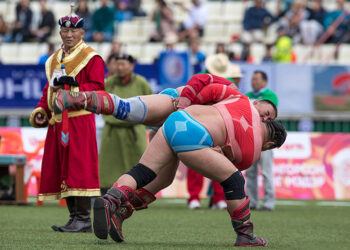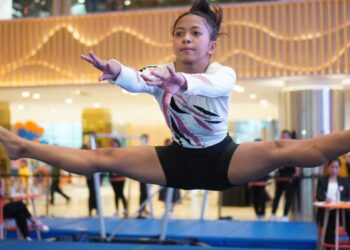![Qureshi reached a career-high ranking of eight in doubles in 2011 [Saba Aziz/Al Jazeera]](https://www.aljazeera.com/mritems/imagecache/mbdxxlarge/mritems/Images/2019/1/8/099f817a2f7e439ab53a15bfcf2a783f_18.jpg)
Doha, Qatar – Aisam-ul-Haq Qureshi is Pakistan’s most successful and high-profile tennis player.
For more than two decades, the 38-year-old athlete from Lahore has been flying his country’s flag on the sport’s highest professional stage, winning trophies and awards.
Qureshi’s best results have come on the doubles’ court, with a career-high ranking of eight, two US Open finals in 2010, 16 titles and a memorable victory against Swiss superstar Roger Federer.
But, as Qureshi notes, it has not all been smooth sailing for the current top 50 Pakistani doubles’ player.
In an interview with Al Jazeera on the sidelines of the Qatar Open, Qureshi talked about the challenges of globe-trotting with a Pakistani passport, the revival of international sports events in the country, and plans to meet the cricketer-turned-prime minister, Imran Khan.
Al Jazeera: You’ve been the lone flag bearer for Pakistan at the top tier of the international tennis circuit, especially Grand Slams, for more than 20 years now. Why do you think there haven’t been any others to follow in your footsteps?
Qureshi: I think the government and the Pakistan Tennis Federation (PTF) have not really been able to cash in on my achievements the way they should have when I was giving results day in and day out in 2007, 2008, 2009, and 2010. The government could have done a lot to promote this game in Pakistan. PTF could have played a very big role to promote the sport in cities where there are no tennis courts.
Ever since I’ve been playing tennis, I’ve hardly seen any new courts or tennis centres built in our cities. There are a lot of people and companies who are willing to sponsor tennis and other sports, but we need to seek their help.
Al Jazeera: As a professional tennis player, you’re on the road 10 to 11 months of the year playing tournaments and training across the globe. What sort of challenges did you face travelling with a Pakistani passport?
Qureshi: I had to face a lot every year. My visas have been rejected many times. There are places I want to go and play where I have not been able to. There were a few times I couldn’t get a visa for Canada and I missed playing the Roger’s Cup. Last year, I wanted to go to China for two to three weeks of training, but I was not able to get the visa.
There are a lot of times when I’m on the road and I have to go back to Pakistan and apply for the visas, which is a pain in the neck, but somehow I try to manage it and schedule tournaments accordingly.
There are still times I feel discrimination and racism, but you learn how to live with it.
 |
| Qureshi has earned a career prize money of more than $3m [Saba Aziz/Al Jazeera] |
Al Jazeera: Ever since the attack on the Sri Lankan cricket team in Lahore in 2009, Pakistan has stopped hosting major sports events – in tennis, Davis Cup, ITF Futures and ITF Juniors. Do you think the security situation and threats have held us back as a sporting nation?
Qureshi: I don’t think the security situation held us back. The international community actually held us back in doing everything. We have provided security for everyone and still do. The only factor was for the international community to get accustomed to it and give us the opportunity to show how secure Pakistan and the playing conditions are.
We are a sport-loving nation no matter which sport we play. If more international sports (events) can come back to Pakistan, the level of every sport in the country is going to improve.
There are still times I feel discrimination and racism, but you learn how to live with it.
AISAM-UL-HAQ QURESHI, PAKISTANI TENNIS PLAYER
Al Jazeera: Tennis is considered an elitist sport in Pakistan – it’s expensive and not easily accessible to the general public. So what will it take for the government and the federation to help produce a Grand Slam champion?
Qureshi: In Pakistan, there is this attitude of “we need a player, we need a player” and then we will shake his hand, we will hug him and make him our own.
We, unfortunately, lack a plan to produce players. Nobody has actually come out of a system. Even the cricketers have been found on the roads or some cricket playing grounds and then they just try to groom them.
The money has to be spent in the right direction and the federation needs to put the players first instead of thinking of themselves. Now the anti-corruption rule in the country (under the new government) is going to play a major factor to improve, not just tennis, but other sports in Pakistan as well.
Al Jazeera: Considering that Prime Minister Imran Khan is a former sportsman himself, do you see that as a promising sign for sports in Pakistan?
Qureshi: For me, 100 percent. I really feel that the standard of all the sports in Pakistan will get better. I’m definitely thinking of having a meeting with him (Khan) or his officials, and try to ask him to grant me land to build an academy. I was refused twice by the previous government, so hopefully, I can be in a position to build one and produce more Aisam Qureshis.
 |
| Qureshi reached the 2010 US Open doubles’ final with Indian partner Rohan Bopanna [Chris McGrath/Getty Images] |
Al Jazeera: India has made many Bollywood films on its sporting icons. There are some talks going on about a biopic on Indian tennis player Sania Mirza. Do you wish to see a movie made on your life and career?
Qureshi: If it can make a difference in people’s lives and make them understand, then I would love to do that. I would love for people to know about the struggles I had. People think I was given a silver spoon in my mouth but they don’t know how tough the journey has been and how much I have worked and sacrificed.
[“source=aljazeera”]






